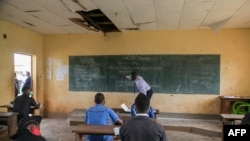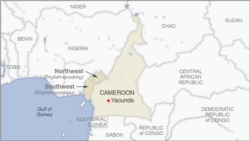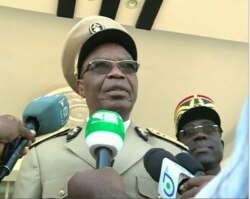Cameroon has launched a campaign to encourage parents to send their children to schools that were closed in rebel conflict areas and for fleeing teachers to return. Cameroon authorities want the schools to reopen by October 5 and say the areas are secure but some parents and teachers question the safety of returning to the schools. Cameroon's military liberated more than a hundred schools from rebel occupation in weekend fighting that left at least nine rebels and several troops dead.
Cameroon’s Ministry of National Education says it has dispatched hundreds of its staff members to English-speaking regions to campaign for schools to reopen on October 5. Bernard Mbuwel, a pedagogic inspector is one of them. He says the future of 400,000 children is at risk should schools remain closed.
"When education is attacked, you have a generation that is failing, there is no succession," he said. "You have increase in cycle of crisis because conflicts cannot be resolved when the children are not educated. We find children evolving while those that are conflict stricken cannot evolve. The children will not be competitive in the job market because they are not educated."
Laboratory technician Philomena Ayeah, 41, fled fighting in the English-speaking northwestern town of Batibo to the capital Yaounde in July. She says she wants her younger siblings to have education without which their future remains bleak in a highly competitive world.
"I am very glad for the children to go back to school," she said. "They should go and learn. They have forgotten so many things. For now they are in the house. They only eat. It is not easy. They play. They have forgotten so many things."
Cameroon’s military reports that within the past four days, troops chased separatist fighters from at least a hundred schools in the English-speaking Northwest region. The Catholic church in the area said the corpses of two soldiers were seen in the northwestern village of Kikaikelaki.
Deben Tchoffo, the region's governor did not confirm troops were killed but says at least 9 separatist fighters lost their lives and 12 others were arrested in Kumbo, Ndop, Santa, Bafut and Wum.
"It was not an easy process, but they [military] are doing their best to secure the region and it is hoped that come 5th of October we must have improved on the security of this region to allow schools to resume," he said. "We have asked the population to organize themselves in vigilante groups to create security around the schools."
Tchoffo said the attacks on schools used by fighters as hideouts is carried out at the same time as the campaign to reopen the schools.
Separatists’ spokesperson Capo Daniel admits that some fighters were attacked. Capo says the separatists now want privately owned schools to reopen in the country's Anglophone regions after 4-years of closure. He says fighters have been asked to keep government schools closed.
"In terms of the Cameroon government schools, we have complete non tolerance which is a complete ban of all schools that are sponsored or functioning under the Cameroon Ministry of National Education," he said. "In areas that we control we have opened up community schools and the teachers who are providing education are doing so on a voluntary basis.
The government of Cameroon this week said the military will escort teachers and students who want to return to schools in various towns and villages.
Teacher Shuri Quinta, 26, who escaped from Kumbo to Yaounde after she was attacked in June for encouraging schools to reopen says their security is not assured.
"Continuous kidnapping and beating of staff [teachers] and students of this region is an indication of inadequate security. I so much long for schools to reopen but in a secured atmosphere. It therefore falls on both sides of the ongoing conflict to guarantee this security and to institute confidence building measures otherwise we are going to be heading for an illiterate society and its associated ills," she said.
The United Nations says Cameroon’s four-year separatist conflict has left over 3,000 people dead and half a million displaced. The crisis started in 2016 when teachers and lawyers took to the streets to complain about the overbearing influence of the French language in the bilingual country. The military responded with a crackdown and separatists took up weapons claiming that they were defending civilians. They asked for a school shutdown and vowed to make the English-speaking regions ungovernable.
--
--






